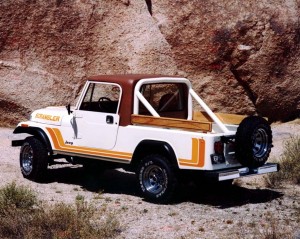After a long debate that put thousands of jobs at risk, Fiat Chrysler Automobiles has decided to retain production of the next-generation Jeep Wrangler in Toledo, Ohio. And CEO Sergio Marchionne confirmed that the maker will add a long-rumored, Wrangler-based pickup to the Jeep line-up.
But Toledo did get one setback in its bid to maintain its long-standing role as Jeep’s ancestral home. FCA will now move production of the Cherokee model to another, as yet-unspecified plant. The compromise follows an intense round of negotiations by Toledo and Ohio officials who struggled to help the automaker reduce costs and update the Toledo plant to handle what will be a radically redesigned version of the ever-popular Wrangler.
“We found a solution that accommodates a variety of other interests to us because of the way in which we can move some product around,” Marchionne told trade publication Automotive News. “It doesn’t take a rocket scientist (to know) that the only way I can move around the Wrangler is to move it into the other Toledo plant.”
Final details aren’t expected to be released until the completion of contract talks between FCA and the United Auto Workers Union. The two sides have a deadline of Sept. 14 to come up with a new, four-year agreement. UAW members voted last month to authorize a strike, if necessary, though senior union officials have stressed that they do not expect that to happen.
The future of the Toledo plant was tossed into the air when FCA announced it would need to make major changes in production to handle the next-generation Wrangler. Due to reach the market in 2018, it is expected to migrate to an aluminum-intensive body in order to save weight and improve fuel economy. But that would require either an entirely new plant, FCA officials warned, or major modifications to the existing Toledo Assembly Complex.
There actually are two plants, the current Wrangler is produced in the Toledo South facility. It will now move to the north side of the complex where Jeep had been building the Cherokee. That larger SUV could move to one of several other FCA factories, including one in the Detroit suburb of Sterling Heights, the other in Belvidere, Illinois.
(Despite rejection, Marchionne continues pushing for GM merger. For more, Click Here.)
Meanwhile, Jeep will use some of the excess capacity in Toledo to return to the pickup truck market, a booming segment it hasn’t participated in for several decades. A four-seat truck will be based off the next-generation Wrangler, TheDetroitBureau.com was told.
The Wrangler plans may not be enough to fill the two Toledo lines, however, and additional products could slot into that plant by the time it rolls out the new Wrangler three years from now, industry sources suggest.
(Click Here for details about divine intervention for the Jeep Wrangler.)
Jeep sales last year surged to 1 million for the first time ever, largely due to a major push in China and other overseas market. The brand is looking to add a variety of new models that could nearly double again sales.
That will include both a new version of the Jeep Grand Cherokee and a revival of the old Grand Wagoneer model. Meanwhile, a single SUV is expected to serve as the replacement for the Jeep Compass and Patriot models.
(To see more about how Jeep sales pushed FCA to another monthly sales increase, Click Here.)
Jeep sales jumped 18% in August, helping FCA achieve its 65th consecutive month of year-over-year sales gains. Wrangler sales have climbed 16.5% for the first eight months of 2015, to 139,930, while Cherokee sales, at 140,888, are up 24.1%.


Recheck your headline…Pickup, not Picked (damn autocorrect, I assume)
Wrangler based pickup…to compete with the Hyundai Santa Cruz? I would think it’d be smaller than the Tacoma/Colorado/Frontiers.
Paul – the headline should be “Pick-up” not “Picked”. I mis-type all the time so this is just an FYI note.
I don’t know if they really need a new plant but they may desire one instead of re-tooling the existing plant.
What about the recall on jeep libty I have a 20006 I Cary a special need child every day.